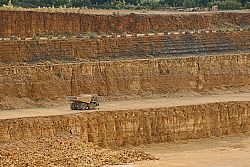

Aggregate Industries UK Limited has had a plan to extend their Chard Junction Quarry in Dorset refused following a planning appeal.
The company wanted to extend the existing quarry and operate it for seven years, extracting an estimated 930,000 tonnes of sand and gravel before restoring the area. The plan involved the retention of the existing processing area, a haul road to the excavation area and an extended site for extraction. This request was refused by Dorset Council because it would harm the area's appearance, cause highway safety issues, affect living conditions and biodiversity. Aggregate Industries UK Limited decided to appeal the refusal.
The appeal site was within the Dorset Area of Outstanding Natural Beauty (AONB). Such areas, once designated, enjoy a certain level of protection under the Countryside and Rights of Way Act 2000, including the fact that in situations such as a planning appeal, the inspector has to have regard to the purpose of conserving and enhancing the natural beauty of the AONB when carrying out their duties.
Inspector J Woolcock, in examining the appeal, decided that the contribution that the extended quarry would make on the appearance of the AONB had been underestimated. The quarry would be intrusive on the landscape and noise would reduce the area's tranquility. Although these effects would be short-term due to the temporary nature of the planning permission sought, the harm that the quarry would do to the area could not be mitigated by restoration at the end of the seven years.
In terms of the other concerns raised, the inspector found:
However, the harm that would be caused to the AONB could not, according to the inspector, be justified in this case. As there were no exceptional circumstances to allow the appeal, the appeal was dismissed and planning permission denied.